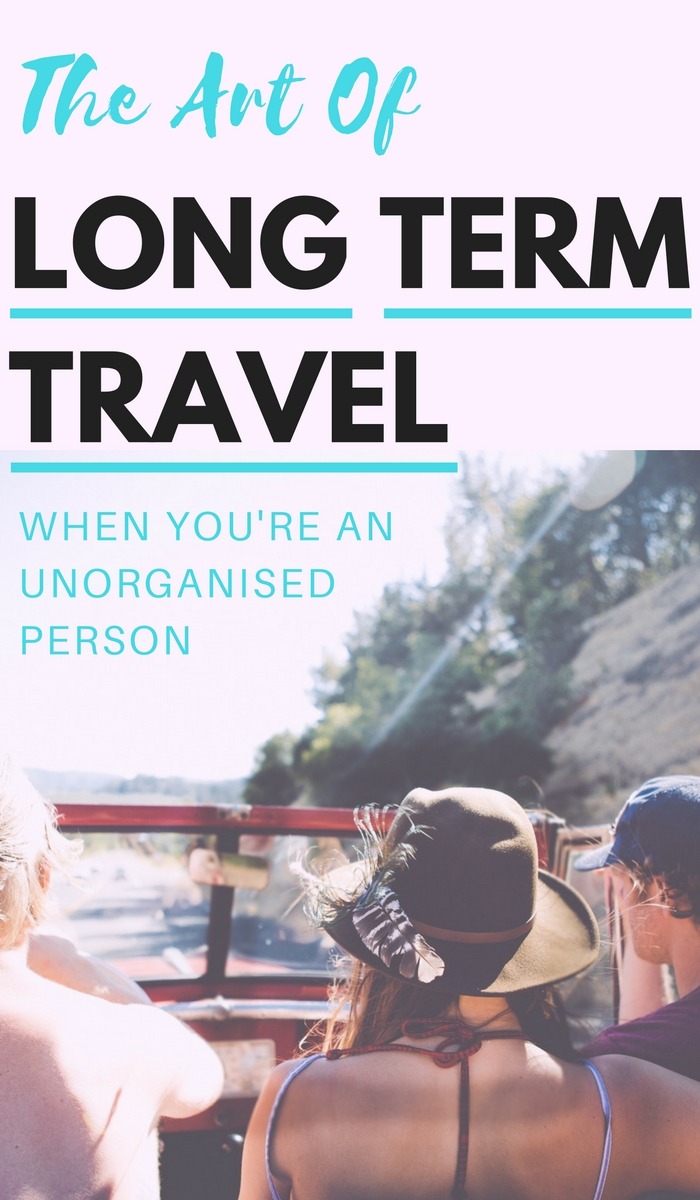Preparing for and embarking on long term travel can feel daunting to say the least…
But what makes the whole process that much harder is when you’re an unorganised person and simply can’t help it.
And just so you know, when it comes to travel I can be so unorganised it even pains me to be me sometimes.
The funny thing is, I’m only terribly unorganised when I’m traveling with Dan. Other times I’ve been fine!
However, the last few times we’ve packed up our bags and bid adieu, I have noticed myself getting a little bit better at it (like today we were only 15 minutes late to the airport instead of the usual 30)…
Perhaps this has something to do with following these next 10 steps for perfecting the art of long term travel when you’re really damn unorganised.
So if you’re anything like me and need a little help to prepare for your next long term travel experience, have a quick read through these tips…
The Art Of Long Term Travel When You’re An Unorganised Person
Remember these tips! Pin this to your travel board on Pinterest >>

1. Use a simple travel checklist
If you’re anything like me, preparing and packing for long term travel can often feel like a daunting task.
You have to spend time finding the cheapest flights, booking accommodation, organising visas, shopping for necessities, packing and so much more that it can be really easy to forget something.
The very best way to make sure you’ve got everything you need for a long term trip is to search some different blogs for travel organisation and packing lists and then create your own checklist.
When it comes time to packing, you can go through the list and check everything off one by one.
Checklists are especially handy for reminding you to bring essential but often forgotten items like power adapters, plastic bags, padlocks, chargers, batteries, and even your passport.
2. Create an itinerary
Next, it pays to have some sort of idea about where you plan to be over the length of your long term travel experience.
For a lot of us, this can already be too much to think about so my advice is to make a plan for at least the first country/first few cities you plan to be in.
Then, once you’ve figured out your next move, you can create another itinerary.
An itinerary simply helps you to remember flight/transport times and also to keep track of your own time.
For example, if you’re only in a city for 2 nights and you plan to do 10 different things, an itinerary will help you to work out how much time you can dedicate to each activity in order to have the most fulfilling experience possible.
To create an itinerary, take all the necessary information from your flight/transport, accommodation and tour confirmations and enter it all into an Excel spreadsheet or Word doc.
This will help you to easily see what’s what without missing anything.
3. Organise visas months in advance
For some countries you plan to visit during your long term travel experience, you will likely have to organise visas in advance.
Visas are not something you can leave until the last minute. Failing to organise the appropriate visas before arriving in certain countries will get you booted out, so take this seriously.
Every country has it’s own visa rules so it is important to Google what is required of you at least 6 weeks before leaving.
For the countries that do require you to apply for a pre-arrival visa, you may be expected to send your passport and itinerary along with your visa application to the consulate, so leave plenty of time for postage as well.
4. Pack less
The first time I traveled with a backpack, it was for a duration of one month and I filled it to the absolute brim. It weighed 20kg, which was crazy heavy for little ol’ me.
Needless to say, I didn’t even use half of what I packed… All that weight holding me back from traveling with ease and I didn’t even need most of it.
I also spent so long digging through a ton of crap to find one little thing at the bottom of the bag each morning that it cut into time I could have used to do something more meaningful.
Oh and not to mention the time it took me to repack after it got all messed up… Not ideal for unorganised people on the road.
So now my advice for long term travelers is to simply pack enough outfits for a 10 day stay.
If you pack just a few outfits that you normally wear, this will reduce the amount of time spent getting ready and packing your bags again when you move onto the next place.
Also, washing machines do exist elsewhere and you will be able to use them frequently, so pack light! You won’t regret it!
5. Pack practically
On top of packing light by only bringing what’s really necessary, it’s important to pack practically when embarking on a long term travel experience, especially if you aren’t a very organised person.
By practically, I’m talking about the following things:
a) Lightweight, wrinkle-free, quick-drying clothing – by not having to wait for your clothes to dry or scurry around looking for an iron, you’ll save you so much time, ensuring that you’ll arrive at the airport before check-in closes every time!
b) Lot’s of plastic bags – these come in handy for everything, whether that’s dirty washing, toiletries or electronic cables/chargers and they’ll keep your bags much more organised.
c) Stick to one main bag (and a carry on if you have a laptop/camera) – this ensures that everything you own is in one place and leaves less gap for mishaps to occur, like leaving a bag in the taxi (like I once did).
6. Book accommodation a few days in advance
There is this myth/expectation that when you’re planning a trip somewhere, you have to book your accommodation months in advance.
Fair enough, if you are only visiting one or two select destinations and want to get accommodation out of the way, book it.
But if you plan to travel around a lot and don’t know where you’re going to be on which dates, it’s better to leave it until closer to the date of your arrival.
Generally, once we’ve decided on which city we’re going to next, we’ll book our accommodation a few days in advance, but there have been times when we’ve left it until the very last minute and it doesn’t always work out so well.
The last time we did this we ended up in a hostel with rude staff and naked people sleeping in the beds beside us. Other times it has been really difficult to find somewhere affordable or with vacancy.
So to be on the safe side, 3 days in advance is usually enough time except during high season and holidays – this is when you do have to book weeks, sometimes months in advance.
6. Photocopy your passport & documents
Now this is a step you need to take seriously, whether you’re an unorganised person or not (but a little bit more if you are).
Photocopying your passport and important travel documents and keeping the copies in a separate place to the originals, ensures that things will work out much more smoothly if you do happen to lose something.
Attempting to travel long term without a passport is a huge and stressful task, so don’t risk it, photocopy everything.
A lot of travelers also print out two itineraries – one for themselves and one for their family or emergency contact. This makes it easier for others to track you if they haven’t heard from you in a while.
7. Buy a large passport/document wallet
I have an A4 size document wallet that sits at the back of my carry on bag at all times. This wallet carries my passports (dual nationality), flight itineraries and original documents.
If I didn’t have this wallet, my passports would be all over the place for a start.
There have been numerous times in the past when I’ve put my passport back in a random part of my bag in a rush at the check-in desk…
And by the time I’d arrived at the gate, I freaked out thinking I’d dropped my passport somewhere (when it was just in another pocket).
So now I always make sure it goes straight back into that wallet.
It’s a definite stress, time and money saver, especially if it means you don’t have to go traipsing all over the airport to find something that was in your bag all along.
I also highly recommend keeping this document wallet in your carry on bag and never in your checked luggage throughout your long term travel experience – because that has been known to go missing on many occasions.
8. Leave hours in advance
Most international flights expect you to be at the airport 2 hours before the flight is due to leave…
So for unorganised people like us, we need to erase that and scribble “3 hours” in our heads instead.
This way, we might actually arrive at the airport 2 hours before the flight leaves and not 30 minutes before, like usual.
If this doesn’t work out for you the first time and you end up missing your bus/train/flight, you’ll definitely learn for next time (this may or may not have happened to us).
9. Travel with a smartphone
These days a smartphone can do almost anything except wash your dishes and cook your dinner (although there are apps to get the job done), so to ensure that you stay ultra organised on the road, bringing a smartphone is essential.
There are countless reasons why a smartphone is going to help you stay organised while you travel long term, some being:
a) Maps – where would we be without Google maps, aye? Instead of wasting time getting lost and then working yourself up into a fluster, use your smartphone to navigate your way around.
b) Alarms – you have an international flight at 8am (and remember you’re aiming to be there 3 hours in advance), setting an early morning alarm on your smartphone will be a lifesaver.
c) Calendar – Enter your itinerary details into your calendar and set alerts to remind you of where you need to be and what time.
d) Social media – Did you meet some travelers on the road and plan to grab a drink later? Social media is the easiest way to get back in contact with them and make plans.
As you probably know, there are plenty more smartphone functionalities that will save you time and time again on the road, so be smart and bring one along (and don’t forget the charger).
10. Travel solo
This last one may sound counterproductive but traveling solo is one of the best ways to kick your own ass into gear and start getting more organised.
The reason for this is because you won’t have anyone else to fall back on… It’s all on you to make this trip a success so being lazy and leaving everything to the last minute just can’t happen.
I find that all my travel plans go really smoothly when I’m on my own and I arrive at the airport on time every time!
There are many benefits of traveling solo other than learning how to be more organised, including meeting new people, battling your fears and opening your mind to new opportunities.
Give it a try!
Over to you! Leave your comments below…
- Are you planning a long term travel experience and looking for more tips on staying organised? Ask away!
- Are you currently traveling or have embarked on a long term travel experience in the past? Share your best tips for staying organised!
































Comments are closed.